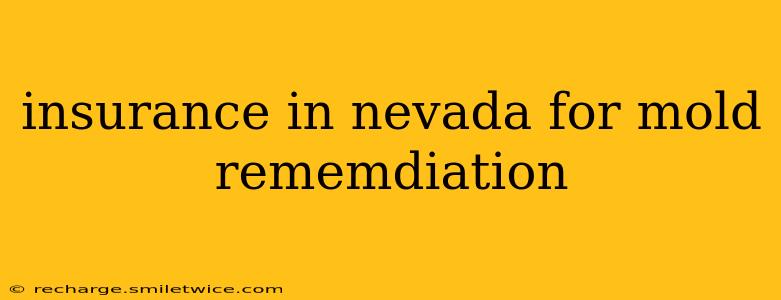Mold infestation is a serious issue, impacting both the structural integrity of your property and the health of its occupants. Navigating the complexities of insurance coverage for mold remediation in Nevada can be challenging. This comprehensive guide will help you understand your rights and options.
What does Nevada law say about mold coverage?
Nevada doesn't have specific laws mandating mold coverage in homeowners' insurance policies. However, most standard policies do offer some level of coverage, but it's crucial to understand the limitations. Coverage typically kicks in if the mold growth results from a covered sudden and accidental event, such as a burst pipe causing water damage that subsequently leads to mold. Conversely, coverage is generally excluded if the mold growth stems from gradual water damage, poor ventilation, or lack of maintenance. This is often where disagreements arise between policyholders and insurance companies.
What types of events typically trigger mold insurance coverage in Nevada?
-
Sudden and Accidental Water Damage: A burst pipe, overflowing toilet, or roof leak resulting in significant water damage that subsequently leads to mold growth is often covered. The key here is the "sudden and accidental" nature of the event.
-
Severe Weather Events: Damage from covered perils like hail, windstorms, or flooding that causes water intrusion and subsequent mold growth usually falls under the policy's coverage.
-
Sewage Backup: If a sewage backup leads to water damage and mold, your policy may cover the remediation.
What is typically not covered under most Nevada homeowners' insurance policies when it comes to mold?
-
Gradual Water Damage: Slow leaks, condensation, or chronic humidity problems that lead to mold growth are usually excluded. These are often seen as preventable issues resulting from poor maintenance.
-
Pre-existing Conditions: If the mold was present before the policy started, it's unlikely to be covered.
-
Normal Wear and Tear: Mold resulting from general deterioration or aging of the property is generally not covered.
-
Lack of Maintenance: Failure to address moisture problems or maintain proper ventilation, leading to mold, usually isn't covered.
How do I file a mold remediation claim with my insurance company in Nevada?
-
Document the Damage: Take detailed photos and videos of the affected areas.
-
Contact your Insurance Company Immediately: Report the damage promptly. Delays can impact your claim.
-
Cooperate with the Adjuster: Allow the insurance adjuster access to your property for inspection.
-
Get Multiple Bids for Remediation: Obtain estimates from several qualified mold remediation contractors.
-
Negotiate with your Insurer: If your claim is denied or you disagree with the settlement offer, negotiate or consider legal counsel.
What if my insurance company denies my mold claim?
If your claim is denied, carefully review the denial letter and your policy. You might have grounds to appeal the decision. Consider consulting with an attorney specializing in insurance disputes to understand your options. They can help you navigate the appeals process or explore alternative legal avenues.
What questions should I ask my insurance agent about mold coverage?
-
What constitutes a "sudden and accidental" event in the context of mold growth? This is often a crucial area of contention.
-
What are the specific exclusions related to mold in my policy? Understand exactly what isn't covered.
-
What is the process for filing a mold remediation claim? Get a clear outline of the steps involved.
-
What is the limit on coverage for mold remediation? Many policies have dollar limits.
-
What types of remediation methods are covered?
Understanding your homeowners' insurance policy and Nevada's legal framework regarding mold is crucial. Proactive steps to prevent mold growth are equally important. Maintaining proper ventilation, addressing leaks promptly, and regularly inspecting your home for signs of moisture can significantly reduce the risk of costly mold remediation. Remember, always consult with qualified professionals for mold assessment and remediation.
